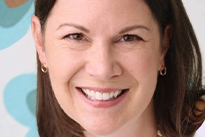
By Lara Schaeffer
I remember from a pretty early age as a girl and young woman being aware that it doesn’t seem very easy being a boy…and I remember thinking about this fairly often. It would be hard, I remember thinking, if you wanted to be trim and muscular but weren’t, if you wanted to be taller than you were, if you didn’t like your voice, or if others didn’t treat you with respect or laugh at your jokes. Looking back, I’m pretty sure I was trying to balance out being painfully aware of the difficulties I faced because I was a girl; somehow contemplating that neither side of the coin is easy seemed to even things out a bit.
I also remember hanging out with the boys during recess and free time, so much so that I referred to myself as a tomboy. I preferred how boys interact with others, their simpler, more straightforward ways of friendships and communication, to what girls tend to demonstrate. I didn’t have the faintest inkling about my autism until I was 45 (which was when my daughter was diagnosed at 15), but I definitely always knew that female social dynamics seem much more complicated and harder to figure out than the male equivalent. And whispers and stares and judgment from others that likely were reactions to some facet or other of my autism…those came from my female “friends” and acquaintances, not from the males. The boys either liked me and treated me well upfront, or just didn’t interact at all. I far preferred that clarity.
It was in high school and college that I started to see the ways that women’s lives were, objectively speaking, more complicated than men’s. Breasts are a clear distinguishing factor…no matter their size they can be a major area for self-doubt, and even for someone like myself who was not well endowed, they can bring monthly pain as well as constant interference, whether one is lying down relaxing, being active, or pretty much anything in between. (And while the aggressive breast cancer that led to the removal of mine is a scourge that men do share, women are far more often the victims of this disease.)
For a majority of young women forming a sense of self, hair, makeup and clothing cause way more than appropriate levels of angst: the first with its many possible styles, some needing quite a bit of manipulation to achieve; the second compelling us to decide how much to apply, if any, and with considerable time and expense (and many Whoops! moments) often accompanying those decisions; and as for the third, no matter now simple and effortless your wardrobe choices, a wealth of possible styles to choose from when shopping and a great range of what is expected in social situations (and when and where), can really complicate life and affect our self-confidence. Granted, men don’t get the same range of choice with hair, make-up/skin products, and clothing styles, but given the polar opposite problem for women and the cost, time, and emotional investment involved, I’d switch places with a man any day in terms of these categories.
Now that I am an adult, I continue to acknowledge the many ways that being a man is not without challenges. But as a female autistic who was undiagnosed until age 47, I have become more aware of how many odds are stacked against women and of the many reasons our life experiences can be especially challenging. Women are more likely than men to be overpowered in relationships or by strangers; women gestate pregnancies, both planned and unplanned, and have shared their bodies for the better part of a year each time a baby is born, afterwards often nursing for extended periods; women are the ones who may experience miscarriages or post-partum depression; women are far more likely than men to be single, working parents; women are more likely to cut their educations short or put their career plans on hold for any number of reasons including, but not limited to, parenting; women are far less likely to reach the upper echelons of most of the career paths they pursue than men are, despite being as intelligent and capable. These challenges and many more are why we need to support each other, and why Women’s History Month is important.
At the same time, I am also aware of and grateful for some distinct gifts and opportunities that grace the lives of women which only we are able to experience and share. My daughter is the pride and joy of my life. I treasure my mother, my aunt, my sister, and my niece…while we are not as close as some families may be, I happen to have no uncles, brothers, or nephews (thankfully my dad helps me keep it real and brings the male perspective to my family life). I was exposed to some of the richness of female relationships for the first time when I began teaching at an all-girls high school sixteen years ago, including positive mentoring and role modeling, community support, and helping to shepherd in the next group in line. These years have developed, expanded, and deepened in me a natural bond with my fellow women.
All of these life experiences have taught me that the relationships women have with each other are responsibilities as well as gifts. They should be nurtured and invested in as well as enjoyed and trusted upon. Happy Women’s History month, everyone.
Author’s Note: Lara has been an autistic high school English teacher for 28 years, but she only found out about her autism three years ago. Her focus is late-identified autism, and she is dedicated to advising and guiding newly identified adult autistics as they adjust to their new truth. She also offers guided self-assessment for autism for adults. You can connect with Lara through her website, http://www.autism-discovery.com/ or follow her posts on LinkedIn.








